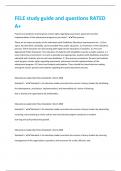FELE study guide and questions RATED
A+
Parents and students must be given certain rights regarding assessment, placement and the
implementation of the educational program as per what? - ✔✔Due process.
There are six major principles of the Individuals with Disabilities Education Improvement Act. 1.) Zero
reject: No child with a disability can be excluded from public education. 2.) Protection in the evaluation
process: There should be non-bias testing with regard to the education of students. 3.) Free and
Appropriate Public Education: The education of students with disabilities must be a public expense. 4.)
Least restrictive environment: As much as possible and appropriate, students with disabilities should be
educated with students who do not have disabilities. 5.) Due process procedures: Parents and students
must be given certain rights regarding assessment, placement and the implementation of the
educational program. 6.) Parent and student participation: There should be shared decision making
among the school, parents and students regarding the special education process.
Educational Leadership Policy Standards: ISLLC1 2008
Standard 1 - ✔✔Standard 1: An education leader promotes the success of every student by facilitating
the development, articulation, implementation, and stewardship of a vision of learning
that is shared and supported by all stakeholders.
Educational Leadership Policy Standards: ISLLC1 2008
Standard 2 - ✔✔Standard 2: An education leader promotes the success of every student by advocating,
nurturing, and sustaining a school culture and instructional program conducive to student
learning and staff professional growth.
Educational Leadership Policy Standards: ISLLC1 2008
Standard 3 - ✔✔Standard 3: An education leader promotes the success of every student by ensuring
management of the organization, operation, and resources for a safe, efficient, and
,effective learning environment.
Educational Leadership Policy Standards: ISLLC1 2008
Standard 4 - ✔✔Standard 4: An education leader promotes the success of every student by
collaborating with faculty and community members, responding to diverse community
interests and needs, and mobilizing community resources.
Educational Leadership Policy Standards: ISLLC1 2008
Standard 5 - ✔✔Standard 5: An education leader promotes the success of every student by acting with
integrity, fairness, and in an ethical manner.
Educational Leadership Policy Standards: ISLLC1 2008
Standard 6 - ✔✔Standard 6: An education leader promotes the success of every student by
understanding, responding to, and influencing the political, social, economic, legal, and
cultural context.
Unallocated funds is best described as... - ✔✔Carryover funds
During the budgeting process, school districts may have money that is left over and not spent during the
current school's fiscal year, known as carryover funds. These funds can be used for the next year's
expenses. Depending on the state the school district is located will determine who will approve the carry
over funds.
Florida Educator Accomplished Practices - ✔✔There are 12 accomplished practices. The Florida
Educator Accomplished Practices are considered the core standards for effective educators and they are
based upon 3 different foundational principles: focus on high expectations, knowledge of subject
matter, and the standards of the education profession. They are: assessment, communication,
continuous improvement, critical thinking, diversity, ethics, human development and learning,
knowledge of subject matter, learning environments, planning, role of the teacher, and technology.
, Decision matrix process - ✔✔A decision matrix, also known as Pugh matrix, selection grid, and criteria
based matrix, is used to evaluate and prioritize a list of options that can be used to make a decision. The
decision matrix procedure is a 6 step process. They are brainstorm evaluation criteria, discuss and refine
the list of criteria, assign a relative weight to each criterion, create a matrix with the criteria and their
weights, evaluate each choice against the criteria, and determine the criteria with the highest, most
important weight.
Principles of Professional Conduct for the Education Profession in Florida - ✔✔An educator is guided by
3 ethical principles. 1.) The educator values the worth/dignity of all persons, pursues truth, devotion to
excellence, acquisition of knowledge, and the nurture of a democratic citizenship. They will work to
guarantee equal opportunity for all students.
2.) The educator's primary concern professionally is for the student and developing the student's
potential. The educator must strive for professional growth and seek to exercise their best professional
judgment as well as integrity.
3.) The educator is aware of the importance of maintaining respect and confidence. They must do this
for colleagues, students, parents, and members of the community.
The Social Learning / Social Change Theory - ✔✔Possesses self efficacy; believes in capability to
perform; recognizes outcomes.
Bloom's Taxonomy - ✔✔(1) Knowledge - find out/remember
(2) Comprehension - understand
(3) Application - use
(4) Analysis - take apart
(5) Synthesis - create new
(6) Evaluation - judge
Assessment categories - ✔✔(1) Self-assessment: Students take responsibility for their own learning.
(2) Teacher assessment: Teachers facilitate the learning and monitoring of particular items.




